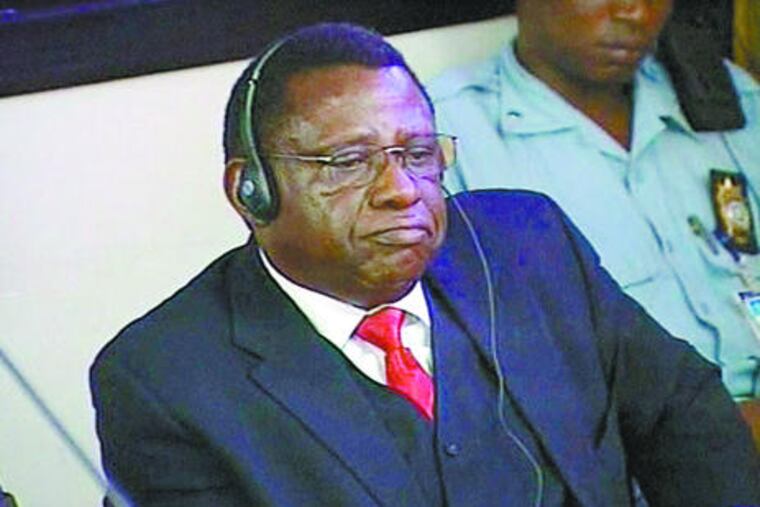Rwandan massacre leader convicted
A U.N. tribunal found a former army colonel guilty of genocide in the 1994 slaughter.

ARUSHA, Tanzania - A former Rwandan army colonel accused of leading the 1994 slaughter of more than 500,000 people was convicted of genocide yesterday and sentenced to life in prison, the most significant verdict of a U.N. tribunal set up to bring the killers to justice.
Col. Theoneste Bagosora was found guilty of crimes against humanity, and the court said he used his position as director of Rwanda's Ministry of Defense to direct Hutu soldiers to kill Tutsis and moderate Hutus.
Former military commanders Anatole Nsengiyumva and Aloys Ntabakuze also were found guilty of genocide and sentenced to life in prison. The former chief of military operations, Brigadier Gratien Kabiligi, was cleared of all charges and released.
"It's been a very important day in the tribunal here, with judgments . . . which shed a lot of light on really what happened on that fateful day," chief prosecutor Bubacar Jallow said.
The court said that Bagosora "was the highest authority in the Rwandan Ministry of Defense with authority over the Rwandan military" and was responsible for the deaths of former Prime Minister Agathe Uwilingiyimana and 10 Belgian peacekeepers who tried to protect her as she was killed at the outset of the genocide.
Bagosora, 67, said nothing as the verdict was delivered, and there was silence from the scores of people who had packed into the aisles of the tiny courtroom to hear the judgment.
"Let him think about what he did for the rest of his life," Jean Pierre Sagahutu, 46, who lost his parents and seven siblings, said in Rwanda. He escaped by hiding in a septic tank for 21/2 months.
The conviction was cheered by genocide survivors, who still live uneasily among perpetrators in the central African nation nearly 15 years later.
U.N. Secretary-General Ban Ki-moon welcomed the convictions, as did Reed Brody of Human Rights Watch. Brody said the sentence was a warning to others accused of crimes against humanity, such as Sudanese President Omar al-Bashir. "It says watch out. Justice can catch up with you," he said.
The killings began on April 7, 1994, the day after a plane carrying ethnic Hutu President Juvenal Habyarimana was shot down by unidentified attackers on its approach to Kigali airport. Bagosora was commander of the Kanombe air base in Kigali when Habyarimana's plane went down.
Hours after the crash, militants from the Hutu ethnic majority known as Interahamwe set up roadblocks across Kigali and the next day began killing Tutsis and moderate Hutus. Government troops, Hutu militia and ordinary villagers spurred on by hate messages broadcast over the radio went from village to village, butchering men, women and children. More than 500,000 were killed in the 100-day slaughter.
The killings ended after Tutsi rebels invaded from neighboring Uganda and drove out the genocidal forces. Bagosora was captured in Cameroon in 1996 and has been in custody in Tanzania since 1997.
About 63,000 people are suspected of taking part in the genocide, although many of them have been sentenced by community-based courts, where suspects were encouraged to confess and seek forgiveness in exchange for lighter sentences.